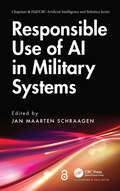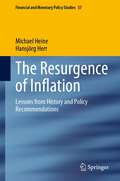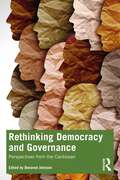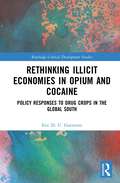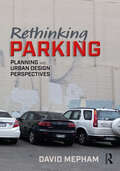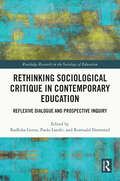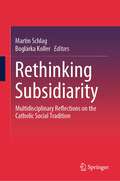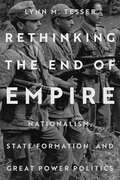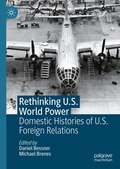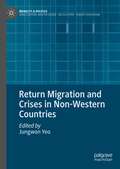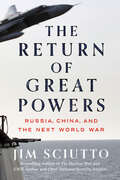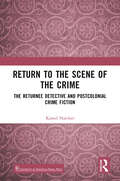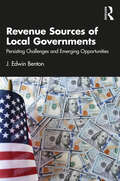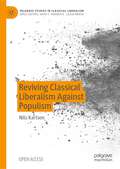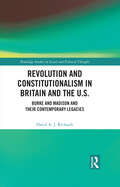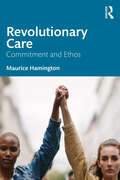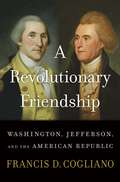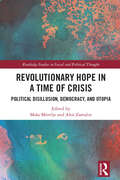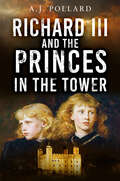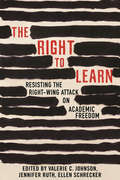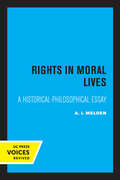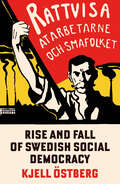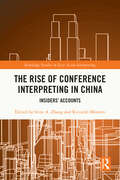- Table View
- List View
Responsible Use of AI in Military Systems (Chapman & Hall/CRC Artificial Intelligence and Robotics Series)
by Jan Maarten SchraagenArtificial Intelligence (AI) is widely used in society today. The (mis)use of biased data sets in machine learning applications is well‑known, resulting in discrimination and exclusion of citizens. Another example is the use of non‑transparent algorithms that can’t explain themselves to users, resulting in the AI not being trusted and therefore not being used when it might be beneficial to use it.Responsible Use of AI in Military Systems lays out what is required to develop and use AI in military systems in a responsible manner. Current developments in the emerging field of Responsible AI as applied to military systems in general (not merely weapons systems) are discussed. The book takes a broad and transdisciplinary scope by including contributions from the fields of philosophy, law, human factors, AI, systems engineering, and policy development.Divided into five sections, Section I covers various practical models and approaches to implementing military AI responsibly; Section II focuses on liability and accountability of individuals and states; Section III deals with human control in human‑AI military teams; Section IV addresses policy aspects such as multilateral security negotiations; and Section V focuses on ‘autonomy’ and ‘meaningful human control’ in weapons systems.Key Features: Takes a broad transdisciplinary approach to responsible AI Examines military systems in the broad sense of the word Focuses on the practical development and use of responsible AI Presents a coherent set of chapters, as all authors spent two days discussing each other’s work This book provides the reader with a broad overview of all relevant aspects involved with the responsible development, deployment and use of AI in military systems. It stresses both the advantages of AI as well as the potential downsides of including AI in military systems.
The Resurgence of Inflation: Lessons from History and Policy Recommendations (Financial and Monetary Policy Studies #57)
by Michael Heine Hansjörg HerrIn light of the resurgence of inflation in developed industrialised countries following a period of inordinately low inflation, this book analyses the causes and devastating effects of inflation by drawing lessons from the past. Focusing on the German hyperinflation of the 1920s and the inflationary waves of the 1970s, it examines the resulting economic crises and their influence on the subsequent periods of social and political turmoil, namely the fascism of the 1930s and the neoliberal revolution of the 1980s. Featuring five detailed case studies on inflationary waves in various countries in the 1970s, the book identifies economic policy errors of the past, seeking to prevent their recurrence. Offering empirical and theoretical insights alike, the authors present strategies for effectively combating inflation and deflation. In turn, the book assesses the complex ties between wage increases, income distribution, and price changes, ultimately providing valuable recommendations on how wage policy can be used to stabilise price level increases at a low level in a world characterised by diverse and extreme economic shocks.“The Resurgence of Inflation” fosters a vital discourse on wage and price dynamics, economic development and the role of trade unions, making it an essential read for policymakers, economists, and anyone seeking a deeper understanding of today’s economic challenges.
Rethinking Democracy and Governance: Perspectives from the Caribbean
by Donavon JohnsonDemocracy can be understood as a concept as well as a system of government associated with certain values, including transparency, accountability, the protection of rights, and non-oppressive government. This cutting edge new book explores the current contours of democracy and asks important questions such as: Does contemporary democracy mean the same thing that it did centuries ago? Are the longstanding assumptions about democracy and good governance sustainable in the face of digital transformation, paradigm shifts, and the liberalization of knowledge? Is democracy still applicable in the way that it has been traditionally envisioned? Gathering together insights from academics and practitioners with expertise on democracy and governance in the Caribbean context, this book is designed to spark a conversation about the ways in which appetites for democracy may be shifting in the Caribbean and beyond, exploring the conditions that brings these shifts to bear. Section one focuses on conceptual pieces that investigate democracy and good governance, their definition, and comparative analysis of how the conceptualization of democracy can shape outcomes in different governmental contexts. Section two explores the ways in which events, trends, and technologies have impacted democratic or undemocratic values and attitudes. Section three examines shifts in democratic inclination in the 21st century. Together the chapters represent an overdue study of the foundational governmental system of our time in a region that has historically been overlooked. Rethinking Democracy and Governance: Perspectives from the Caribbean is required reading for students of governance, public administration, and public policy.
Rethinking Illicit Economies in Opium and Cocaine: Policy Responses to Drug Crops in the Global South (Routledge Critical Development Studies)
by Eric D. GutierrezThis book investigates the cross-border trade in illicit drug crops in the global south. It exposes an important paradox: despite all the dangers and negative consequences of these criminal networks, in many cases, they also provide marginalised and excluded communities with important private sources of protection, investment, and employment. This book reconstructs and compares socioeconomic contexts, criminal careers, and changes in farmgate prices of illicit coca and opium poppy crops in Afghanistan, Myanmar, Colombia, and Bolivia. It investigates the politics of strange bedfellows; informal bankers-without-suits providing cross-border financial services to the undocumented and the unbanked; the criminals without borders; and the mystery of illicit crop prices. The book challenges commonly held assumptions and casts new light on how relationships of conflict and accommodation are arranged and re-arranged in fluid, ever-changing contexts, producing often paradoxical outcomes. It then suggests policy reforms and alternative approaches to drug policy, development aid, and peacebuilding work. Researchers and students across development, peacebuilding, illicit economies, and conflict studies will find this book an important source of original research and analysis. It will also be useful for politicians, commentators and public officials considering what to do differently in tackling illicit drug economies.
Rethinking Parking: Planning and Urban Design Perspectives
by David MephamFor much of the past century, we have viewed the issue of parking from the driver’s seat. It follows that key narratives about parking reaffirm the immediate needs of the driver. A consequence of this approach is a failure to understand the significant damage that parking causes to the destination. That damage is amplified by ‘cheap, easy’ parking at the expense of place and access outcomes. Viewing parking from an urban planning and design perspective highlights different issues and opportunities. Five perspectives are offered: Place – If we gave drivers all the parking they wanted, the destination would not be worth visiting. Politics – Parking is intensely territorial, emotional, and prone to populism, and this is a barrier to strategic and sustainable parking reform. Policy – Parking tends to be focused on the ‘me, here and now’ needs of the driver at the expense of bigger picture and longer term policy objectives. Price – Subsidized parking exists behind opaque pricing mechanisms. In contrast, a transparent accounting of costs is a vehicle for strategic parking reform. Professional practice – Parking is a significant land-use issue, located at the juncture of transport and urban planning and design. Improving urban parking outcomes requires an integrated and collaborative planning process. An alternative view of parking is timely as new technologies and economies fundamentally change everything we understand about parking. A potential paradigm shift is in the making. Rethinking Parking provides a pathway to a better parking/place balance and access to destinations worth visiting. It is valuable reading for students and professionals engaged in transport, planning, urban access, and design.
Rethinking Sociological Critique in Contemporary Education: Reflexive Dialogue and Prospective Inquiry (Routledge Research in the Sociology of Education)
by Radhika Gorur Paolo Landri Romuald NormandThis book explores a new repertoire for critique in the sociology of contemporary education, focusing on emerging social theories that respond to contemporary challenges in education, education policy and governance. Presenting a variety of approaches in the sociology of education including pragmatist critical sociology, neo-Marxism, post-digital sociology, new materialisms, affirmative critique of education, and post-colonial studies, the chapters in this book engage in a novel, collective dialogue and reflection on the affordances, limitations and challenges of emerging social theories in contemporary education. The book further justifies this novel approach through inclusion of a series of interviews with leading scholars and thinkers from within and outside the field of education on the subject of critique in contemporary society and education. The book offers relevant global and decolonial perspectives to study current transformations, drawing on innovations in theorizing and empirical illustrations from different countries. Highlighting alternative visions of these transformations in an era of globalization, fragmentation, and growing nationalism, this cutting-edge book will be of great interest to researchers, academics and postgraduate students in the fields of the sociology of education, the philosophy of education, social theory, political science and comparative policy and politics more broadly.
Rethinking Subsidiarity: Multidisciplinary Reflections on the Catholic Social Tradition
by Martin Schlag Boglárka KollerThis book takes a fresh and interdisciplinary approach to the concept of subsidiarity. While subsidiarity is commonly understood as an organizational principle that assigns competences to the appropriate level within an organization, its application extends beyond politics. This innovative book offers a comprehensive analysis that includes religious and secular perspectives, exploring the relevance of subsidiarity to society, business, law and politics.By bridging the gap between theology, philosophy, political science, law, and history, this volume fills a significant gap in the literature. It reexamines the ideological foundations of subsidiarity within the Catholic social tradition, investigates its practical implications, and questions how it can address the challenges faced by contemporary business environments, particularly issues of social inequity. With a normative and conceptual approach, the book critically reflects on the links between subsidiarity and themes such as responsible business practices, ecological concerns, individual autonomy, and the common good. By exploring the potential of subsidiarity to overcome dichotomies and promote a middle ground between government-based solutions and individual freedom, the volume offers valuable insights and practical solutions.This volume stands out as the first major study dedicated to subsidiarity in society, business, law and politics. Through its multidisciplinary lens, it sheds light on unexplored connections and highlights the role of subsidiarity in fostering ethical and socially responsible behavior. It is an essential resource for researchers, PhD and graduate students, as well as professionals in theology, philosophy, political sciences, law, and history who seek a comprehensive understanding of subsidiarity and its implications for contemporary issues.
Rethinking the End of Empire: Nationalism, State Formation, and Great Power Politics
by Lynn M. TesserWhy did a nation-state order emerge when nationalist activism was usually an elitist pursuit in the age of empire? Ordinary inhabitants and even most indigenous elites tended to possess religious, ethnic, or status-based identities rather than national identities. Why then did the desires of a typically small number result in wave after wave of new states? The answer has customarily centered on the actions of "nationalists" against weakening empires during a time of proliferating beliefs that "peoples" should control their own destiny. This book upends conventional wisdom by demonstrating that nationalism often existed more in the perceptions of external observers than of local activists and insurgents. Lynn M. Tesser adds nuance to scholarship that assumes most, if not all, pre-independence unrest was nationalist and separatist, and sheds light on why the various demands for change eventually coalesced around independence in some cases but not others.
Rethinking U.S. World Power: Domestic Histories of U.S. Foreign Relations
by Daniel Bessner Michael BrenesSince the late-1990s, diplomatic historians have emphasized the importance of international and transnational processes, flows, and events to the history of the United States in the world. Rethinking U.S. World Power provides an alternative to these scholarly frameworks by assembling a diverse group of historians to explore the impact of the United States and its domestic history on U.S. foreign relations and world affairs. In so doing, the collection underlines that, even in a global age, domestic politics and phenomena were crucial to the history of U.S. foreign policy and international relations more broadly.
Return Migration and Crises in Non-Western Countries (Mobility & Politics)
by Jungwon YeoThis edited book focuses on the intersection of return migration and crises in non-Western countries. The book explores a wide range of theoretical and methodological perspectives while offering practical insights to address the intricate issues surrounding return migration and crises. The topics covered within this volume include return migration trends, the pivotal roles and contributions of return migrants, the social, psychological, and policy challenges faced by returnees, emerging issues stemming from return migration in their home countries, and the public and formal responses to return migration and the reintegration of returnees, and the roles of crises in these areas.This edited volume brings together diverse perspectives of academic researchers, practitioners, and policymakers on return migration. The book features cases of multiple non-Western countries in Asia (Philippines, China, India), Europe (Lithuania, Turkey, & Ukraine), the Middle East and North Africa (Morocco), and South America and the Caribbean (Mexico, Peru & Dominican Republic). Findings provide a unique opportunity to critically explore current thinking on return migration and investigate the relationship between migration and crisis from varying policy and operational viewpoints. This book, hence, attends to practitioners to develop creative solutions to both global and local policies and practices of return migration management in emerging market countries, which will support and accommodate both their returnees and residents amid challenging times.
The Return of Great Powers: Russia, China, and the Next World War
by Jim SciuttoThe essential new book by CNN anchor and chief national security analyst Jim Sciutto, identifying a new, more uncertain global order with reporting on the frontlines of power from existing wars to looming ones across the globe. <p><p> The fall of the Berlin Wall in 1989 dawned what Francis Fukuyama called “The End of History.” Three decades later, Jim Sciutto said on CNN’s air as the Ukraine war began, that we are living in a “1939 moment.” History never ended—it barely paused—and the global order as we long have known it is now gone. Powerful nations are determined to assert dominance on the world stage. And as their push for power escalates, a new order will affect everyone across the globe. Russia’s invasion of Ukraine is a part of it, but in reality, this power struggle impacts every corner of our world—from Helsinki to Beijing, from Australia to the North Pole. This is a battle with many fronts: in the Arctic, in the oceans and across the skies, on man-made islands and redrawn maps, and in tech and cyberspace. <p><p> Through globe-spanning, exclusive interviews with dozens of political, military, and intelligence leaders, Sciutto defines our times as a return of great power conflict, “a definitive break between the post–Cold War era and an entirely new and uncertain one.” With savvy, thorough, in-person reporting, he follows-up his 2019 bestseller, The Shadow War: Inside Russia’s and China's Secret Operations to Defeat America, which focused on the covert tactics of a hidden conflict. <p><p> The Return of Great Powers analyzes a historic and visible shift in real time. It details the realities of this new post–post–Cold War era, the increasingly aligned Russian and Chinese governments, and the flashpoint of a new, global nuclear arms race. And it poses a question: As we consider uncertain, even terrifying, outcomes, will it be possible for the West and Russia and China to prevent a new World War? <p> <b>New York Times Bestseller</b>
Return to the Scene of the Crime: The Returnee Detective and Postcolonial Crime Fiction
by Kamil NaickerA crime novel, at once disturbing and perversely comforting, factually has been known to curtail social anxieties through the ‘open and shut case’ of its narrative form. But what happens to that form in a world where guilt and innocence are not easily assigned? Return to the Scene of the Crime takes place on the trope of an investigator returning to the post-colony on a quest for knowledge. In tandem with solving the case, they must also grapple with the complexities of their origins. Kamil Naicker shows how five authors defy generic expectations to illustrate the complexities of personal identity, transitional justice, and civil violence in the post-colonial world. Congregating novels set in South Africa, China, Guatemala, Sri Lanka and Somalia, this book intervenes in literary studies by bringing the trend of the returnee figure and exploring the possibilities of world-making through the explosion of a familiar form. Print edition not for sale in Sub Saharan Africa.
Revelation 911: How the Book of Revelation Intersects with Today's Headlines
by Paul BegleyA riveting account of current events as foretold in the mysterious Book of Revelation.A series of unparalleled apocalyptic events—predicted in a third of the Bible—is approaching. They will so shake the world that people&’s hearts fail them for &“fear and the expectation of those things which are coming on the earth&” (Luke 21:26). In Revelation 911, Pastor Paul Begley—host of the syndicated television show The Coming Apocalypse and a popular YouTube show with more than 240 million views—and Pulitzer Prize–nominated investigative journalist Troy Anderson show that signs of the approaching Apocalypse are accelerating exponentially. A catastrophic economic collapse and global conflagration could be next on the prophetic timeline. Then comes the Antichrist, False Prophet, and &“mark of the beast&” economic system. The authors also explore why the popular transhumanist movement, artificial intelligence, and top-secret government and military programs are linked with prophecies of the last days. Despite its stunning disclosures, Revelation 911 offers hope, comfort, and blessings to help readers navigate this tumultuous time through the power, protection, and provision of the Holy Spirit.
Revenue Sources of Local Governments: Persisting Challenges and Emerging Opportunities
by J. Edwin BentonWith limited fiscal capabilities, effective and efficient budgeting is a necessity for local governments in the United States. Acknowledging the critical (but often overlooked) part that raising enough revenue to fund desirable and mandatory programs plays in the budgetary process, this book offers an exclusive and comprehensive examination of the revenue side of the budget. It provides much-needed and wide-ranging context for examining and understanding local government revenues and local government revenue policy.Author J. Edwin Benton presents a comprehensive overview of the revenue structure for local governments, in general, and for counties, municipalities, townships, special districts, and school districts, in particular. The bulk of this book meticulously examines the historical patterns and trends in revenue usage by local governments and provides explanations for variations among different units of government, states, and regions of the country. This book enhances our understanding of the most relevant research and aids in refining theories that seek to explain why local governments (or different types of local governments) rely more on certain kinds of revenues. It also offers immediately applicable real-world case studies on revenue-raising capabilities, practicalities, and experiences of local governments around the country. It will be of enormous interest to public budgeting practitioners, students, and scholars.
Reviving Classical Liberalism Against Populism (Palgrave Studies in Classical Liberalism)
by Nils KarlsonThis open access book by Nils Karlson explores the strategies used by left- and right-wing populists to make populism intelligible, recognizable, and contestable. It presents a synthesized explanatory model for how populists promote autocratization through the deliberate polarization of society. It traces the ideational roots of the core populist ideas and shows that these ideas form a collectivistic identity politics. Karlson argues that to fight back requires the revival of liberalism itself by defending and developing the liberal institutions, the liberal spirit, liberal narratives, and liberal statecraft. The book also presents and discusses an extensive list of counterstrategies against populism. Written within the tradition of political theory and institutional economics, this book uses a wide variety of sources, including results and analyses from social psychology, ethics, law, and history.
Revolution and Constitutionalism in Britain and the U.S.: Burke and Madison and Their Contemporary Legacies (Routledge Studies in Social and Political Thought)
by David A. RichardsIn Revolution and Constitutionalism in Britain and the U.S.: Burke and Madison and Their Contemporary Legacies, David A. J. Richards offers an investigative comparison of two central figures in late eighteenth-century constitutionalism, Edmund Burke and James Madison, at a time when two great constitutional experiments were in play: the Constitution of the Glorious Revolution of 1688 and the U.S. Constitution of 1787. Richards assesses how much, as liberal Lockean constitutionalists, Burke and Madison shared and yet differed regarding violent revolution, offering three pathbreaking and original contributions about Burke’s importance. First, the book defends Burke as a central figure in the development and understanding of liberal constitutionalism; second, it explores the psychology that led to his liberal voice, including Burke’s own long-term loving relationship to another man; and third, it shows how Burke’s understanding of the political psychology of the violence of “political religions” is an enduring contribution to understanding fascist threats to political liberalism from the eighteenth-century onwards, including the contemporary constitutional crises in the U.S. and U.K. deriving from populist movements. Mixing thorough research with personal experiences, this book will be an invaluable resource to scholars of political science and theory, constitutional law, history, political psychology, and LGBTQ+ issues.
The Revolution Takes Form: Art and the Barricade in Nineteenth-Century France
by Jordan Marc RoseDuring the French Revolution of 1830, insurgents raised some four thousand barricades. Afterward, lithographs of the street fighting flowed from the presses, creating the barricade’s first imagery. This book documents the changing political valence of the revolutionary ideals associated with the barricade in France from 1830 to 1852.The Revolution Takes Form coordinates the political reality of the barricade with the divergent ways in which its image gave shape to the period’s conceptions of class, revolution, and urban space. Engaging the instability of the barricade, art historian Jordan Marc Rose focuses on five politically charged works of art: Eugène Delacroix’s La Liberté guidant le peuple, Honoré Daumier’s Rue Transnonain, le 15 avril 1834 and L’Émeute, Auguste Préault’s Tuerie, and Ernest Meissonier’s Souvenir de guerre civile. The history of these artworks illuminates how such revolutionary insurrections were characterized—along with the conceptions of “the people” they mobilized. Foregrounding a trajectory of disillusionment, growing class tensions, and ultimately open conflict between bourgeois liberals and the proletariat, Rose both explains why the barricade became a compelling subject for pictorial reflection and accounts for its emergence as the period’s most poignant and meaningful symbol of revolution.Original and convincing, this book will appeal to students and scholars of art history and, in particular, of the history of the French Revolution.
Revolutionary Care: Commitment and Ethos
by Maurice HamingtonWritten by one of the world’s most respected care scholars, Revolutionary Care provides original theoretical insights and novel applications to offer a comprehensive approach to care as personal, political, and revolutionary. The text has nine chapters divided into two major sections. Section 1, "Thinking About Better Care," offers four theoretical chapters that reinforce the primacy of care as a moral ideal worthy of widespread commitment across ideological and cultural differences. Unlike other moral approaches, care is framed as a process morality and provides a general trajectory that can only determine the best course of action in the moment/context of need. Section 2, "Invitations and Provocations: Imagining Transformative Possibilities," employs four case studies on toxic masculinity, socialism and care economy, humanism and posthumanism, pacifism, and veganism to demonstrate the radical and revolutionary nature of care. Exploring the thinking and writing of many disciplines, including authors of color, queer scholars, and indigenous thinkers, this book is an exciting and cutting-edge contribution to care ethics scholarship as well as a useful teaching resource.
A Revolutionary Friendship: Washington, Jefferson, and the American Republic
by Francis D. CoglianoThe first full account of the relationship between George Washington and Thomas Jefferson, countering the legend of their enmity while drawing vital historical lessons from the differences that arose between them.Martha Washington’s worst memory was the death of her husband. Her second worst was Thomas Jefferson’s awkward visit to pay his respects subsequently. Indeed, by the time George Washington had died in 1799, the two founders were estranged. But that estrangement has obscured the fact that for most of their thirty-year acquaintance they enjoyed a productive relationship. Precisely because they shared so much, their disagreements have something important to teach us.In constitutional design, for instance: Whereas Washington believed in the rule of traditional elites like the Virginia gentry, Jefferson preferred what we would call a meritocratic approach, by which elites would be elected on the basis of education and skills. And while Washington emphasized a need for strong central government, Jefferson favored diffusion of power across the states. Still, as Francis Cogliano argues, common convictions equally defined their relationship: a passion for American independence and republican government, as well as a commitment to westward expansion and the power of commerce. They also both evolved a skeptical view of slavery, eventually growing to question the institution, even as they took only limited steps to abolish it.What remains fascinating is that the differences between the two statesmen mirrored key political fissures of the early United States, as the unity of revolutionary zeal gave way to competing visions for the new nation. A Revolutionary Friendship brilliantly captures the dramatic, challenging, and poignant reality that there was no single founding ideal—only compromise between friends and sometime rivals.
Revolutionary Hope in a Time of Crisis: Political Disillusion, Democracy, and Utopia (Routledge Studies in Social and Political Thought)
by Maša Mrovlje Alex ZamalinRevolutionary Hope in a Time of Crisis takes up the question of how to theorize and revive revolutionary hope in the present era of political disillusion. The collection consists of new cutting-edge research essays written by an interdisciplinary mix of established and emerging scholars, bringing together a wide range of intellectual traditions and perspectives. The contributors confront the challenge of relearning hope by exploring the politically transformative potential of past disappointments and defeats. They encourage us to acknowledge, come to terms with and learn from the complexities, failures, and losses entailed in resistance, and to consider them as an occasion for rethinking the established patterns of revolutionary thought. Specifically, the essays question how engagement with past disappointments, losses, and defeats can help us creatively respond to the difficulties and failures of resistance—and inspire our imagination of revolutionary possibilities in the present. Written in an accessible tone without theoretical density or academic jargon, Revolutionary Hope in a Time of Crisis provides theoretical and historical contexts to what it means to engage in left activism today. A vital resource for those interested in intellectual history, political history, radical politics, democracy, and contemporary political theory.
Richard III and the Princes in the Tower
by A. J. PollardA look at the original sources and depictions that have informed our view of Richard III through history
The Right To Learn: Resisting the Right-Wing Attack on Academic Freedom
by Jennifer RuthFrom leaders on the front lines of the battle for academic freedom in higher education, an empowering collection on fighting back against anti-CRT policies, book banning, and moreSpanning over 40 years of contested history through to today, The Right to Learn speaks out fearlessly against the far right&’s decades-long war against intellectual freedom. This essential anthology outlines and contextualizes the culture wars&’ demonization of critical race theory, Ron DeSantis&’s &“Don&’t Say Gay&” law, and other hot-button issues.With an introduction that places the current crisis within the broader context of the ongoing attacks on American democracy, The Right to Learn features the testimony and analysis of activists, scholars, and attorneys with first-hand experience in the struggle against well-funded conservative groups&’ assaults on academic freedom. An impassioned, inspired resource for those fighting on the ground for the right to learn, this anthology is structured in three parts designed to equip educators with the necessary tools to understand the battle—and to fight back.—PART 1 explores educational gag laws, featuring, among others, PEN America staff members Jonathan Friedman, Jeremy C. Young, and James Tager.—PART 2 offers perspectives on key issues from those on the front lines: activists, educators, and attorneys like Dennis Parker, director of the National Center for Law and Economic Justice.—PART 3 investigates the implications of undermining academic freedom, with insight from experts such as Sharon D. Wright Austin, one of the professors barred by the University of Florida from testifying against a restrictive voting rights law and a plaintiff in the main legal case against Ron DeSantis&’s &“Stop WOKE Act.&”As they confront today&’s attack on higher education, The Right to Learn&’s expert contributors reveal that what&’s at stake is the pursuit of the real-world and contemporary knowledge a democratic polity requires.
Rights in Moral Lives: A Historical-Philosophical Essay
by A. I. MeldenIn Rights in Moral Lives, A. I. Melden, a distinguished philosopher and moral rights theorist, examines important changes that have occurred in our thinking about rights since first mention of them was made in early modern times. His inquiry is framed by an opening question and a concluding response. The question is whether the Greeks had any conception of a moral right. Some argue that they did not, on the ground that they had no word for a right. Others claim that they did, since they employed certain locutions, the equivalents of which in our language are tied to some notion of a moral right. Melden reviews in detail some of the most important historical conceptions of rights and examines serious questions raised by the fact that there have been striking changes in our thinking about rights. His discussion elucidates the place of moral rights in the broader network of moral concepts, along with the role they should play in our moral lives. Among the fundamental issues raised and discussed are the ways in which we are to understand various sorts of rights, the relation of special moral rights to our basic human rights, the now familiar claim that there are animal rights, the nature of moral progress, and the dream of a moral science. This title is part of UC Press's Voices Revived program, which commemorates University of California Press’s mission to seek out and cultivate the brightest minds and give them voice, reach, and impact. Drawing on a backlist dating to 1893, Voices Revived makes high-quality, peer-reviewed scholarship accessible once again using print-on-demand technology. This title was originally published in 1988.
The Rise and Fall of Swedish Social Democracy
by Kjell OstbjergWhatever happened to the poster child of European social democracy?For a young generation of socialists, the Swedish experience has been an obvious reference and inspiration. But what remains of the Swedish model today is, in fact, a failed project in decline. This book is the first comprehensive study of the rise and fall of one of the most influential political movements of our time.Ostberg depicts the rise of one of the 20th century's best organized labor movements and Sweden's development from one of Europe's poorest countries to one of the richest and with the most extensive welfare. During the last 90 years, Sweden had a social democratic prime minister for 72 years, including a 44 year uninterrupted span. The Swedish model culminated in the 1970s. Under the pressure of wildcat strikes and new social movements, a highly competent Social Democratic government implemented unique social reforms mainly through a decommodified public sector. Many reforms had a distinct gender equality character. The Social Democratic-led trade union movement sought to take over control of Swedish companies through wage earners&’ funds. Was Sweden on its way to becoming a socialist country?Instead, Swedish Social Democracy quickly adapted to the economic and political conditions of the neoliberal counter-revolution. Today, large parts of the public sector have been privatized and social inequality has increased faster than in most other countries, despite social democratic governments in power. The Social Democratic party is being challenged by the right-wing populist Sweden Democrats as the largest labour party.Kjell Ostbjerg discusses the strength and weakness of the reformist strategy, the importance of class organizations and social mobilization and the struggle for power in the workplace, the influence of the labor bureaucracy, the role of women in the creation of the Swedish welfare society and the dependence of Social Democracy on the development of international capitalism.
The Rise of Conference Interpreting in China: Insiders' Accounts (Routledge Studies in East Asian Interpreting)
by Irene A. Zhang Riccardo MorattoIn this landmark project, Professor Zhang and Professor Moratto piece together the history of how conference interpreting developed as a profession in China after the reform and opening up of the late 1970s. Based on interviews with the alumni of the early efforts to develop conference interpreting capabilities between Chinese and English (and French), the authors illuminate the international programs and relationships which were instrumental in bringing this about. While paying tribute to the earliest interpreters who interpreted for the first-generation CPC leaders including Mao Zedong, Zhou Enlai, and Deng Xiaoping, they track key cooperative projects between Chinese ministries and both the United Nations and European Union, as well as China’s domestic efforts, which developed into today’s formal programs at major universities. An essential resource for scholars and students of conference interpreting in China, alongside its sister volume Conference Interpreting in China: Practice, Training and Research.
